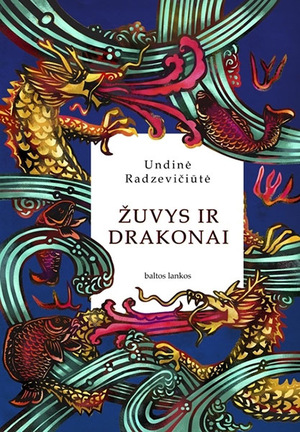Muddy water of culture while catching fish and dragons 3
In brief: Undinė Radzevičiūtė novel "Fishes and Dragons" won this year's European Union Prize for Literature, which aims to enrich the translations and thus expand the visibility of authors. Such evaluation inspires to once again - or maybe for the first time, if the reader is lost among the multitude of books - open this novel.
According to literary critic Jūratė Čerškutė, U. Radzevičiūtė is a master of small prose. One of the main characteristics of the writer's style is a concentrated, accurate sentence. In this review, we go back to 2013 and look at the longest novel of the prose writer - "Fishes and Dragons" of four hundred and seventy pages, when her latest book is almost by a third thinner - two hundred and seventy eight pages.
Writer preserves her style and even in this large-scale piece speaks in concise, short sentences; playfully shifting from words and meanings she opens up polysemous layers of languages. This book is multifaceted, multilayered, multi-thematic, thus it can be interpreted, analyzed and most importantly read in many different ways. However, in order to grasp and isolate a substantial line, the main thread of meaning it should be mentioned that it is a meeting, welcoming or/and contradiction of Eastern and Western cultures. Novel depicts a contemporary Western world, or more accurately, Europe, and the Eastern world is brought back in time to the 18th century. Writer is not looking for the sharp edges of differences, but rather opens up a truth and singularity of the being of two different worlds.
In her novel U. Radzevičiūtė actualizes the stereotypes of thinking. It is a vice common to both - China of the past and contemporary Europe. "Members of the jury think that horse heads are too small and ankles - too thin. Telling them that these are Iberian horses and that is exactly how they should be, does not help. / Commission, it seems, has doubts not only about the Iberian horses, but about the Iberia itself." (p. 5) Respect for tradition not only maintains and protects itself - it is also a cultural foundation, which, if lost, threatens with extinction. However, excessive insularity and rejection of other type of thinking causes a gap, a divide. Whether it is good or bad, we can think in terms of the context of the European story in the novel, looking at the images of today's reality.
In the East dragon is a positive symbol, which means a multiple and diverse being. In the West it signifies the exact opposite - Satan. That is how it becomes clear that it is not easy to bring two cultures together and even more so, to unify them - it can be dangerous and harmful. "Castiglione is particularly bothered by dragons with a fish body. The symbol of Christ coupled with a dragon is uncomfortable for his eye" (p. 194). From the Christian perspective the tangle of opposites - fish (symbol of Christ) and dragon (symbol of Satan) is more than inappropriate. After realizing that it becomes obvious that an attempt to, artificially and often to drastically, merge different cultures threatens the essence, the very foundation of existence. The image of a dragon with a fish body is an ambivalent hybrid, which implies and conveys a cultural degradation, decline and death.
U. Radzevičiūtė novel speaks about things that are not ephemeral, or common. It is a cultural cocktail, made meaningful by the carnivalesque book cover made by the artist Vanda Padimanskaitė. Writer U. Radzevičiūtė, who has a good knowledge of art history, puddles the water and invites you to check how much fish or dragon you have in you...









